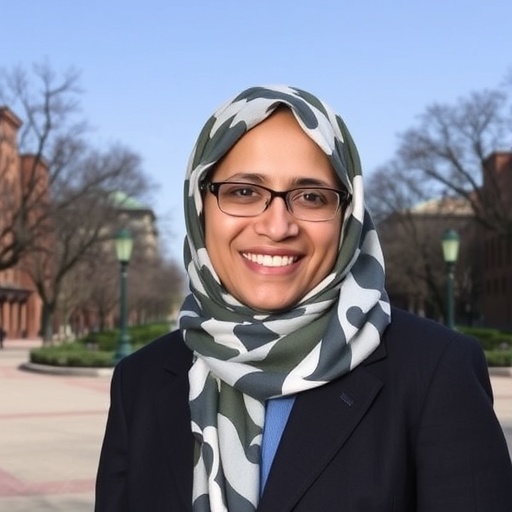Dr. Sarah Khasawinah has recently been appointed as a Visiting Scholar within the prestigious Gerontological Society of America (GSA), an institution at the forefront of aging research and policy since 1945. Her new position comes at a pivotal moment when the intersection between scientific innovation and legislative action is more critical than ever for addressing the multifaceted challenges of aging populations worldwide. Dr. Khasawinah’s extensive background in health policy, particularly her decade-long tenure shaping bipartisan legislative frameworks in the U.S. Senate, positions her uniquely to influence the trajectory of national aging initiatives through GSA’s policy programs.
Throughout her career, Dr. Khasawinah has engaged deeply in the sophisticated mechanisms of federal policy development, honing expertise in regulatory frameworks, budgetary appropriations, and bipartisan negotiation techniques. These strategic competencies empowered her to shepherd landmark legislation such as the reauthorization of the Older Americans Act (OAA), a foundational statute governing an array of services and protections for the elderly. Her role entailed navigating complex political landscapes characterized by competing interests, enabling the passage of legislation that supports both current and future generations of older adults with measurable, sustained impacts.
Khasawinah’s policy work transcends traditional gerontology, incorporating emerging concerns such as cognitive health and neurological research. Among her notable achievements is her instrumental leadership in the creation and passage of the BOLD Infrastructure for Alzheimer’s Act, which established a comprehensive public health infrastructure aimed at Alzheimer’s disease and related dementias. This act represents a transformative shift in addressing neurodegenerative conditions from a systemic and preventative perspective, emphasizing early intervention strategies and multidisciplinary coordination across research, clinical practice, and community outreach.
During the onset of the COVID-19 pandemic, Dr. Khasawinah applied her policy expertise to confront unprecedented challenges faced by older populations disproportionately affected by the virus. She designed and executed the first federal Senate hearing specifically focused on the pandemic’s impact on older adults, highlighting the intricacies of infection control, healthcare resource allocation, and social determinants of health that exacerbate vulnerability. Her subsequent input into major relief legislations such as the Families First Coronavirus Response Act and the CARES Act underscored her ability to translate clinical and epidemiological data into effective policy frameworks amidst crisis conditions.
Her academic foundation bolsters her policy leadership, with a PhD in mental health from Johns Hopkins University, where her research concentrated intensively on brain health and the aging process. Complementing this, her Master of Health Science in biostatistics with a focus on neuroimaging equips her with rigorous quantitative and methodological skills essential for interpreting complex neurological datasets. This scientific grounding informs her advocacy for evidence-based policy and enhances her capacity to bridge research insights with legislative priorities to foster innovative approaches in aging research and care.
Dr. Khasawinah’s work also extends to combating systemic fraud within federal healthcare programs. Her leadership in restoring and expanding the U.S. Senate Fraud Hotline catalyzed significant investigations into Medicare fraud, highlighting the intersection of policy oversight, regulatory enforcement, and ethical stewardship. Such initiatives play a crucial role in safeguarding the integrity and sustainability of healthcare funding, ensuring that resources intended for older adults are utilized effectively and justly.
The Gerontological Society of America’s strategic decision to integrate Dr. Khasawinah into its Visiting Scholar and Executive Program underscores a broader commitment to advancing a bipartisan approach to aging policy. Her presence is anticipated to invigorate GSA’s influence within federal policy circles, facilitating the translation of cutting-edge gerontological research into actionable legislative agendas. This alignment of scientific inquiry with policymaking represents a critical pathway for addressing challenges such as mental health, caregiving, drug pricing, and healthcare transparency in an aging society.
At a macro level, the inclusion of seasoned policy strategists like Dr. Khasawinah signals a maturation of aging science that emphasizes not only discovery but also application. Her role exemplifies the growing recognition that sustainable improvements in elder care and health outcomes require a continuum from laboratory research to legislative advocacy and community practice. This continuum is particularly salient as demographic shifts intensify the urgency for scalable, evidence-based policies that can adapt to diverse and evolving needs among older populations.
Dr. Khasawinah’s stated ambition to elevate cognitive health as a national priority reflects a forward-looking vision that integrates neurological research advancements with public health frameworks. By leveraging Senate relationships and policy expertise, she aims to catalyze efforts that accelerate innovation in brain health, ultimately fostering resilience and quality of life among aging adults. This initiative resonates strongly amid rising prevalence of dementia and related disorders, representing a critical frontier in aging science and social policy.
In conclusion, Dr. Sarah Khasawinah’s appointment to the Gerontological Society of America embodies a powerful synthesis of scientific rigor, policy acumen, and bipartisan collaboration. Her contributions will not only enhance GSA’s capacity to advocate for robust federal funding in aging research but will also help safeguard and improve the complex systems of care on which millions of older adults depend. As the aging population continues to swell globally, such interdisciplinary leadership is indispensable for forging effective, equitable solutions to the challenges—and opportunities—that lie ahead.
Subject of Research: Aging policy, cognitive health, Alzheimer’s disease, public health infrastructure, mental health, Medicare fraud, legislative strategies in aging.
Article Title: Not provided.
News Publication Date: Not provided.
Web References: https://www.geron.org/vse
References: Not provided.
Image Credits: Not provided.
Keywords: Gerontology, aging policy, Alzheimer’s disease, Older Americans Act, mental health, biostatistics, neuroimaging, COVID-19 and older adults, Medicare fraud, bipartisan legislative strategy.




